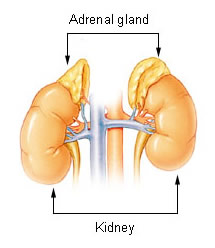
Mr. Bishop, a 43 year old ace blogger, has type 2 Diabetes Mellitus and frequent high blood pressure. He woke up one day noticing purplish pink - colored stretch marks on his abdomen, thighs and buttock. Also, he was easily bruised but hard to heal. Alarmed, he visited his physician immediately. The physician later noticed Mr. Bishop's high cortisol levels. He was then subjected to further testing.
...
OK, so we started off on a serious note. Well, I'm not going to bombard you with jargons and leave you totally clueless of what's going on. Let's keep it simple. By the bye, keep note of Mr. Bishop, his condition will help in our synthesis later.
In the case mentioned earlier, Mr. Bishop was said to have high cortisol levels. In situations such as these, answering point blank won't do. As a soon-to-be medical practitioner, it would be more comprehensible to follow the detailed approach and discover everything systematically. First stop: the creator.

As corny as it may sound, the "creator" of cortisols is the adrenal gland. Simply put, it is the ADrenal, meaning near the renal glands. Retroperitoneally located, this "2-piece" gland is pyramidal in shape weighing 4 grams each and 2 inches in length. Surrounded by renal fascia and adipose, the suprarenal gland (its name in other literature) is.. um.. well.. an endocrine gland (what did you expect?). A little history, these glands were recognized at the late 16th century. But it was not until 1805 that a certain Cuvier geek divided the glands into 2 portions: the medulla (inner) and the cortex (outer).
Having said all these, we're not there yet. Well, technically speaking, the 2 portions of the adrenal gland produce separate set of hormones. Since cortisol is the main character in our CSI-like journey, let's focus on the cortex. It is after all the bakery baking the pie.
The adrenal cortex cells exude an array of hormones using cholesterol as its raw material. These hormones, a.k.a., corticosteroid hormones, are produced in 3 regions: zona glomerulosa (outer), zona fasciculata (middle) and zona reticularis (inner). Their cells are jam-packed with lipid droplets (housing cholesterol) used for making the hormones. Microscopic as they are, each zone produces specific hormones, somewhat like a department store. For the Glomerulosa department, mineralocorticoids such as aldosterone are "manufactured". On the other hand, Fasciculata department is responsible for supplying glucocorticoids such as cortisols. And lastly, the Reticularis department produces partly some cortisol and androgens such as androstenedione and the ever famous testosterone (though only in minute amounts).
Wait, something's still left trivial.. What are mineralocorticoids, glucocorticoids and androgens? Maybe Ma'am Ghie will discuss it to you..
...
Or not.. it is my assignment after all..
Glucocorticoids, as the name suggests, are hormones chiefly responsible for stimulating gluconeogenesis in the liver. Also, it has other roles such as stimulation of fat breakdown, amino acid mobilization from the extrahepatic tissues and glucose uptake inhibition in muscle and adipose tissues. The main glucocorticoid is cortisol (Alas!) comprising 95% of glucocorticoid activity. Otherwise known as the "stress hormone" (since it is elevated in stress), cortisol is responsible for the immobilization of free fatty acids and spare glucose for the brain. Furthermore, it regulates blood pressure, cariovascular function, and the body's protein, carbs, and fat usage. Quite handy a hormone if I might add. Hydration helps control cortisol levels. A quick tip: hydrate more in in the middle of a stressful day.
OK! Now we're done.. or not.. again.. Since i already made mention of the different "departments", might as well discuss them, right? Right! SO, mineralocorticoids were first observed in their involvement in sodium retention - a mineral. The major mineralocorticoid is aldosterone which is responsible for Na, K, and water homeostasis. It helps in increasing resorption of water and sodium and increased renal excretion of potassium. Very handy in controlling hydration.
The last is androgens. Androgens are not primarily secreted by the adrenal glands. However, they aid in the production, but only in minimal amounts. The adrenal androgens famous are dehydroepiandrosterone (DHEA) and androstenedione. So much for the so-called male hormones.
OK (again)! Now back to Mr. Bishop's case. His signs and sypmtoms would most probably be diagnosed to a Cushing's Syndrome. This condition is otherwise known as hypercortisolism due to a marked increase in cortisol levels. The next plan of action may be to check for tumors (adenoma) in the pituitary gland. Its presence cause increased production of adrenocorticotropic hormone (ACTH) which will then eventually elevate cortisol levels.
Phew! That was close (not to mention my submission is hanging by a thread)! Hope it would help much to your knowledge and understanding. Thanks! = }
For a crash course regarding the adrenal gland in general, watch this video:
-SIDETRACK-
(This part of my blog would feature some of Facts of Life. Just sharing.)
Perfection is always relative. What is perfect to me may be unsatisfactory to others. What matters is self satisfaction and inner peace. Create a craft worth remembering and live a life of content in accordance to how perfect you perceive it to be.
-References-
For Adrenal glands:
http://www.answers.com/topic/adrenal-gland
http://arbl.cvmbs.colostate.edu/hbooks/pathphys/endocrine/adrenal/steroids.html
For Glucocorticoids:
http://arbl.cvmbs.colostate.edu/hbooks/pathphys/endocrine/adrenal/gluco.html
http://en.wikipedia.org/wiki/Gucocorticoid
http://copd.about.com/od/emphysema/a/glucocorticoids.htm
http://cpharm.vetmed.vt.edu/vm8784/GLUCOCORTICOIDS/glucocort.htm
For Minelaocorticoids:
http://arbl.cvmbs.colostate.edu/hbooks/pathphys/endocrine/adrenal/mineralo.html
http://en.wikipedia.org/wiki/Mineralocorticoid
For Androgens:
http://e.hormone.tulane.edu/learning/androgens.html
http://en.wikipedia.org/wiki/Androgen

